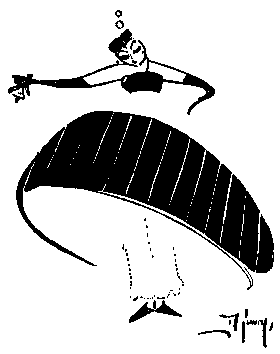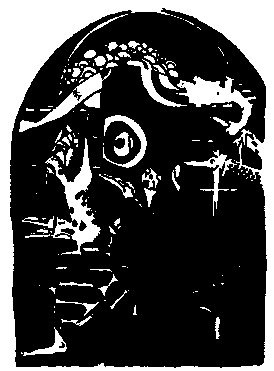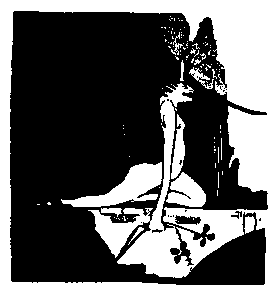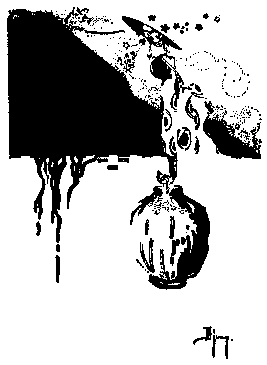



THE BOOK OF REPULSIVE WOMEN
FROM FIFTH AVENUE UP
![]() OMEDAY beneath some hard
OMEDAY beneath some hard
Capricious star—
Spreading its light a little
Over far,
We'll know you for the woman
That you are.
For though one took you, hurled you
Out of space,
With your legs half strangled
In your lace,
You'd lip the world to madness
On your face.
We’d see your body in the grass
With cool pale eyes.
We'd strain to touch those lang'rous
Length of thighs,
And hear your short sharp modern
Babylonic cries.
It wouldn't go. We’d feel you
Coil in fear
Leaning across the fertile
Fields to leer
As you urged some bitter secret
Through the ear.
We see your arms grow humid
In the heat;
We see your damp chemise lie
Pulsing in the beat
Of the over-hearts left oozing
At your feet.
See you sagging down with bulging
Hair to sip,
The dappled damp from some vague
Under lip,
Your soft saliva, loosed
With orgy, drip.
Once we'd not have called this
Woman you—
When leaning above your mothers
Spleen you drew
Your mouth across her breast as
Trick musicians do.
Plunging grandly out to fall
Upon your face.
Naked—female—baby
In grimace,
With your belly bulging stately
Into space.
IN GENERAL
![]() HAT altar
cloth, what rag of worth
HAT altar
cloth, what rag of worth
Unpriced?
What turn of card, what trick of game
Undiced?
And you we valued still a little
More than Christ.
SEEN FROM THE "L"
![]() O SHE
stands—nude—stretching dully
O SHE
stands—nude—stretching dully
Two amber combs loll through
her hair
A vague molested carpet pitches
Down the dusty length of stair.
She does not see, she does not care
It’s always there.
The frail mosaic on her window
Facing starkly toward the street
Is scribbled there by tipsy sparrows—
Etched there with their rocking feet.
Is fashioned too, by every beat
Of shirt and sheet.
Sill her clothing is less risky
Than her body in its prime,
They are chain-stitched and so is she
Chain-stitched to her soul for time.
Ravelling grandly into vice
Dropping crooked into rhyme.
Slipping through the stitch of virtue,
Into crime.
Though her lips are vague as fancy
In her youth—
They bloom vivid and repulsive
As the truth.
Even vases in the making
Are uncouth.
DRAWINGS BY DJUNA BARNES




IN PARTICULAR
![]() HAT
loin-cloth, what rag of wrong
HAT
loin-cloth, what rag of wrong
Unpriced?
What turn of body, what of lust
Undiced?
So we’ve worshipped you a little
More than Christ.
FROM THIRD AVENUE ON
![]() ND now she
walks on out turned feet
ND now she
walks on out turned feet
Beside the litter
in the street
Or rolls beneath a dirty sheet
Within the town.
She does not stir to doff her dress,
She does not kneel low to confess,
A little conscience, no distress
And settled down.
Ah God! she settles down we say;
It means her powers slip away
It means she draws back. day by day
From good or bad.
And so she looks upon the floor
Or listens at an open door
Or lies her down, upturned to snore
Both loud and sad.
Or sits besides the chinaware,
Sits mouthing meekly in a chair,
With over-curled, hard waving hair
Above her eyes.
Or grins too vacant into space—
A vacant space is in her face—
Where nothing came to take the place
Of high hard cries.
Or yet we hear her on the stairs
With some few elements of prayers,
Until she breaks it off and swears
A loved bad word.
Somewhere beneath her hurried curse,
A corpse lies bounding in a hearse;
And friends and relatives disperse,
And are not stirred.
Those living dead up in their rooms
Must note how partial are the tombs,
That take men back into their wombs
While theirs must fast.
And those who have their blooms in jars
No longer stare into the stars,
Instead, they watch the dinky cars—
And live aghast.
TWILIGHT OF THE ILLICIT
![]() OU, with your
long blank udders
OU, with your
long blank udders
And
your calms,
Your spotted linen and your
Slack'ning arms.
With satiated fingers dragging
At your palms.
Your knees set far apart like
Heavy spheres;
With discs upon your eyes like
Husks of tears,
And great ghastly loops of gold
Snared in your ears.
Your dying hair hand-beaten
’Round your head.
Lips, long lengthened by wise words
Unsaid.
And in your living all grimaces
Of the dead.
One sees you sitting in the sun
Asleep;
With the sweeter gifts you had
And didn't keep,
One grieves that the altars of
Your vice lie deep.
You, the twilight powder of
A fire-wet dawn;
You, the massive mother of
Illicit spawn;
While the others shrink in virtue
You have borne.
We'll see you staring in the sun
A few more years,
With discs upon your eyes like
Husks of tears;
And great ghastly loops of gold
Snared in your ears.
TO A CABARET DANCER
![]() THOUSAND
lights had smitten her
THOUSAND
lights had smitten her
Into this thing;
Life had taken her and given her
One place to
sing.
She came with laughter wide and calm;
And
splendid grace;
And looked between the lights and wine
For one
fine face.
And found life only passion wide
’Twixt
mouth and wine.
She ceased to search, and growing wise
Became
less fine.
Yet some wondrous thing within the mess
Was held
in check:—
Was missing as she groped and clung
About his
neck.
One master chord we couldn't sound
For lost
the keys,
Yet she hinted of it as she sang
Between
our knees.
We watched her come with subtle fire
And
learned feet,
Stumbling among the lustful drunk
Yet
somehow sweet.
We saw the crimson leave her cheeks
Flame in
her eyes;
For when a woman lives in awful haste
A woman
dies.
The jests that lit our hours by night
And made them
gay,
Soiled a sweet and ignorant soul
And fouled its
play.
Barriers and heart both broken—dust
Beneath
her feet.
You've passed her forty times and sneered
Out in the
street.
A thousand jibes had driven her
To this at
last;
Till the ruined crimson of her lips
Grew vague
and vast.
Until her songless soul admits
Time comes
to kill;
You pay her price and wonder why
You need
her still.
SUICIDE
Corpse A
![]() HEY brought
her in, a shattered small
HEY brought
her in, a shattered small
Cocoon,
With a little bruised body like
A startled moon;
And all the subtle symphonies of her
A twilight rune.
Corpse B
![]() HEY gave her
hurried shoves this way
HEY gave her
hurried shoves this way
And that.
Her body shock-abbreviated
As a city cat.
She lay out listlessly like some small mug
Of beer gone flat.
About The Book of Repulsive Women
Excerpts from Andrew Field's biography Djuna, The Life and Times of Djuna Barnes (G. P. Putnam's Sons, New York 1983) which concern The Book of Repulsive Women:
"The first book by Djuna Barnes, really more a booklet
with eight poems and five drawings, The Book of Repulsive
Women, appeared as Number 20, Special Series, of the Chap
Books in November 1915. It sold for fifteen cents at first, but
its price was very quickly raised to fifty cents when it became
clear that the chapbook was enjoying notoriety. ...
The atmosphere of Barnes' eight
"rhythms" is quite in keeping with the book's title. We
must remember that while this was a period in which the forces of
European Decadence were still being very much felt, no less in
the United States than in Scandinavia, Italy, Poland and Russia,
there was certainly in all the English-speaking countries as late
as 1915 an extraordinary reticence on sexual themes in
literature. Oscar Wilde did not write his homosexuality; he
merely practised it. The Book of Repulsive Women, a full
decade before Radclyffe Hall's Well of Loneliness, was
the first modern literary work in English to bring the theme of
woman's "bitter secret" (it is never named) to the
misty fore:
Someday beneath some hard
Capricious star—
Spreading its light a little
Over far,
We'll know you for the woman
That you are....
See you sagging down with bulging
Hair to sip,
The dappled damp from some vague
Under lip,
Your soft saliva, loosed
With orgy, drip.
One must assume that, in spite of the collection's title and the telltale word orgy, the Sumner committee was either incapable of recognizing or of articulating what that "vague under lip" from which the repulsive woman sags down to sip was. Barnes had boldly and deftly taken advantage of a public inability to comprehend what such images might portray. Thus there was an astonishingly easy if meaningless victory over censorship. Like Queen Victoria when her advice was sought on the legal position of lesbians, the American censors evidently couldn't imagine the offense.
...
It has been the tendency in discussions of the Barnes oeuvre to relegate The Book of Repulsive Women to the bin of "early work," which these poems certainly are, and yet some of the best stanzas have the same anemic power of early Eliot and phrases that stick in the mind:
Those living dead up in their rooms
Must note how partial are the tombs,
That take men back into their wombs
While theirs must fast.
And those who have their blooms in jars
No longer stare into the stars,
Instead, they watch the dinky cars—
And live aghast.
...
The Book of Repulsive Women remained an underground work. It was to be more than half a century before it was even mentioned in print.
...
Miss Barnes began to avoid the word publisher altogether. She said printer instead, and much worse. She had to contend with a pirated edition of The Book of Repulsive Women issued by a Yonkers bookseller. ..."
Final comments
The 1948 Alicat Bookshop Press edition, on which this Internat page is based, was not only pirated but also very cheaply made and hard to read (green type on thick blackish paper). It also left out the author's dedication:
TO MOTHER
who was more or less like All
mothers, but she was mine, —and
so— She excelled
Even though I might incur the late Djuna Barnes' wrath (it's very likely she'd group me with the "printers or much worse") by publishing this on the Internet, I simply could not resist. The Book of Repulsive Women — including the curiosity of the pirated edition — is a true underground gem of 20th century literature.
Johannes Beilharz, December 2000